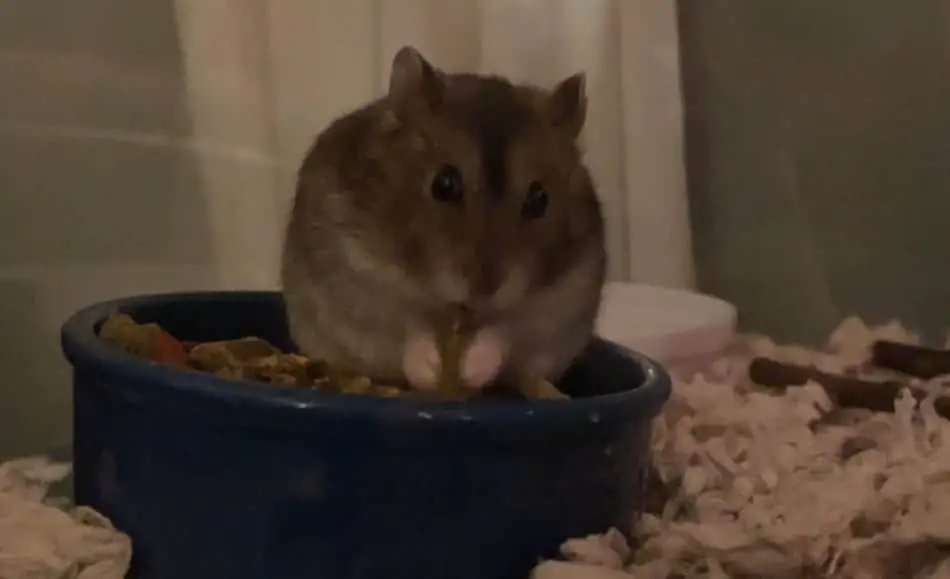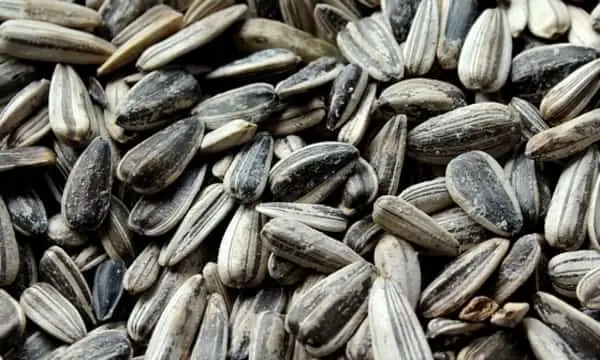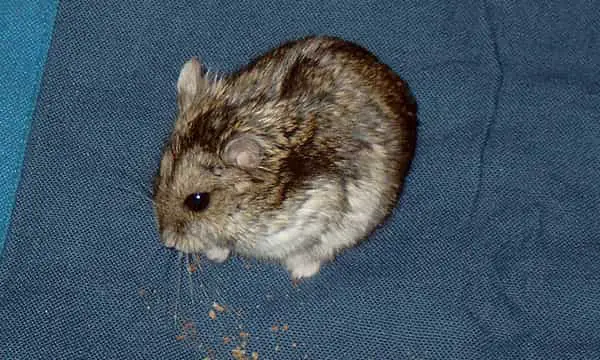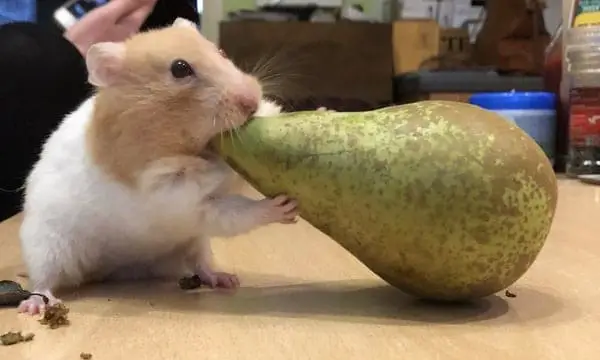Hamster food mixes often include a huge variety of grains, pellets, nuts, seeds, and even dehydrated fruits and veggies. But have you ever filled your hamster’s food dish with this kaleidoscope of tasty goodies only to find everything stays right there except for the sunflower seeds?
So, why does my hamster only eat sunflower seeds? Sunflower seeds are full of fat and calories, causing them to taste delicious and be very satisfying. They also contain vital nutrients hamsters need to stay healthy. However, a diet that solely consists of sunflower seeds lacks many other important nutrients and may cause unhealthy obesity.
This article will explain what your hamster gets from sunflower seeds, why they may pick them out of a food mix, and how to get your hamster to eat other things besides sunflower seeds. It will also discuss the benefits and risks of a hamster eating sunflower seeds as well as what other foods a hamster needs to balance out its diet.
Sunflower Seeds Are Tasty and Nutritious
Studies have shown that the fat content in a food may make it more enjoyable to eat. Although it has no taste of its own, fat concentrates the other flavors in the food, causing them to taste stronger and more delicious. It also gives food a creamy texture that is very pleasant and sends “happy” signals to the brain.
Foods high in calories have a similar affect, and just like people, hamsters may crave these high-fat, high-calorie foods. They’re just so satisfying.
Sunflower seeds are high in both fat and calorie content. One tablespoon of seeds has about 51.7 calories and 4.7 grams of fat. Eating them is immediately rewarding to a hamster and may cause it to go back to them again and again, neglecting other foods.
Nutrients Available in Sunflower Seeds
Not only does the fat and calorie content of sunflower seeds make them especially satisfying for hamsters and give them an energy boost, these seeds are also rich in essential vitamins and minerals. Each of these nutrients contributes to your hamster’s overall health.
- Potassium—supports the function of vital organs like the heart and kidneys.
- Iron—encourages healthy blood flow and oxygen absorption.
- Calcium—keeps your hamster’s teeth and bones healthy.
- Vitamin E—is essential for healthy eyes and skin.
- Magnesium—regulates blood pressure.
- Antioxidants—protect your hamster from disease and cancer.
That Delectable Crunch
Additionally, sunflower seeds have chewy, crunchy shells that satisfy your hamster’s instinct to gnaw. Crunching on the crisp shells is actually good for your hamster in a couple of ways. First, it helps to wear down their teeth, which are constantly growing. Secondly, it allows them to work for their food, which can help keep them happy and occupied.
Risks of Feeding Too Many Sunflower Seeds
As long as they are consumed in moderation, there is nothing wrong with your hamster getting the fat and calorie content of sunflower seeds, and as we’ve seen, they will also benefit from the other nutrients contained in the seeds. However, eating too many sunflower seeds can be detrimental to your hamster’s health.
Obesity, Diabetes, and High Cholesterol
First, too much of a high-fat, high-calorie food can lead to obesity, diabetes, and high cholesterol, as well as other health issues. These can greatly decrease your hamster’s quality of life as well as shortening its lifespan.
For hamsters, sunflower seeds are kind of like desserts or processed snacks. They’re tasty and even contain beneficial components, but they should be consumed in moderation.
Malnutrition
Despite their nutritional benefits, sunflower seeds don’t contain all of the nutrients your hamster needs to live a long, healthy life. Eating them to the exclusion of all other foods will eventually cause your hamster to become malnourished.
This doesn’t mean it will be too thin—eating that many sunflower seeds is more likely to make it overweight. It means your hamster won’t have all of the vitamins, minerals, and proteins it needs for its body to function normally. It may succumb to disease or begin to break down physically or mentally.
Too Much Vitamin C
Sunflower seeds are also high in vitamin C, which is good in moderation. Too much vitamin C, however, can mess with your hamster’s digestion, causing diarrhea.
A Healthy Serving of Sunflower Seeds
So how many sunflower seeds are too many and how many are just right? Should your hamster have any at all? It’s definitely okay for your hamster to have a few sunflower seeds, and it will benefit from their nutritional density and good fat content. The number of seeds your hamster should have depends on its size.
- Syrian hamsters (the largest breed) can have around three sunflower seeds per day.
- Robo hamsters (a medium-sized breed) may have two sunflower seeds.
- Dwarf or Chinese hamsters (the smallest breed) should really have no more than one sunflower seed per day.
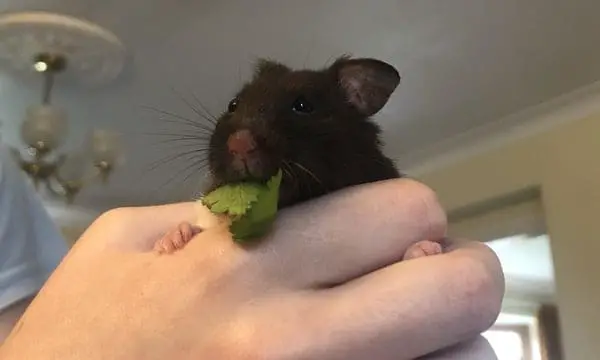
How to Get Your Hamster to Eat Other Foods
Now that you’re aware of the fact that eating only sunflower seeds is not good for your hamster, how can you get it to eat some of those other foods you’ve been filling its dish with? The good news is a hamster will not starve itself if deprived of its favorite food. So you have options.
Save Sunflower Seeds as Treats
You can pick all of the sunflower seeds out when you fill your hamster’s food dish and save them for treats. A hungry hamster will quickly dive into the other food items provided, and getting sunflower seeds only from you will lend enjoyment to your interactions.
Feed Your Hamster Less
If your hamster picks the sunflower seeds out of its dish, leaving the rest of the food untouched, you may be overfeeding. Don’t top off the dish whenever this happens. Instead, wait for your hamster to empty its dish before feeding again.
Of course, you shouldn’t be feeding so much that the food sits there for weeks or your hamster carries it all off and hoards it. Food that sits for too long will get stale or grow mold. Try to feed only as much at a time as your hamster will eat in about 2 days.
This will vary between hamsters, and it may take some trial and error to learn how much your hamster needs, but a good rule of thumb is one to two tablespoons of food every two to three days.
Feed a Variety
It’s important to offer a variety of foods to keep your hamster healthy and interested. Although hamster mixes already contain an exciting mix of ingredients, you may find it most beneficial to mix two or more types of food. Avoid feeding a diet entirely made up of pellets or solely made up of seeds and grains.
A block or pellet-type hamster food mixed with a seed- and grain-based hamster mix is one that will ensure your hamster is getting all of the nutrients it needs and won’t becoming bored with its food. You can also offer small amounts of fresh vegetables, fruits, and even a mealworm now and then. In general, your hamster’s diet should contain 17-19% protein, 4-7% fat, and 6-15% fiber.
Other Seeds and Goodies Your Hamster Can Have
A hamster that eats only sunflower seeds is really missing out, and you can show it this by offering other goodies. Other seeds and grains are a good way to start. Pumpkin seeds, millet, flax seed, oats, barley, and nuts can all be offered in moderation.
Vegetables and Fruit
Hamsters also enjoy and benefit from small amounts of vegetables and fruit. Just be careful to build up to these slowly as a bunch of new veggies or fruit can upset your hamster’s digestive system and cause diarrhea.
Try introducing a small amount of a new veggie every day or even every other day. Make sure the amount is small enough that your hamster finishes it immediately. Hamsters love to store their food for later, but doing this with a veggie can cause it to spoil or mold. Fruit should be offered in even smaller amounts and only as a treat.
Other Treats
Along with seeds, nuts, and veggies, other treats you can feed your hamster include low-sugar and low-sodium cereal or puffs. Some hamsters also enjoy nibbling on dog biscuits, which provide extra protein and help wear down their teeth. Things like yogurt drops or sweetened store-bought treats should not be given more than once a week as they often contain high amounts of sugar.
Conclusion
Sunflower seeds’ high-calorie, high-fat, and nutrient-dense composition make them pretty much irresistible to hamsters, and in moderation, they’re an important part of your hamster’s diet.
However, feeding a variety of other foods is essential in maintaining your pet’s long-term health. If sunflower seeds are limited, and you feed small portions, allowing your hamster to eat nearly everything before refilling the dish, it should quickly become used to consuming other foods.

